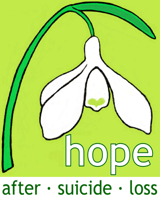HOPE is dedicated to providing a high standard of service to survivors in Suffolk and at some point in the future, we will launch our first group in Norfolk.
Using feedback from our survivors, HOPE is in the unique position to offer this information to first on the scene including the police, fire brigade, coroners office and long term providers like the Norfolk and Suffolk Foundation Trust. We have become an established service in Suffolk and we are taking that expertise into Norfolk.
The aim is to provide a comprehensive support package specifically tailored to meet the needs of suicide loss, to alleviate isolation, reduce secondary suicides and offer a service with no waiting list. In the long term we believe our service will lessen the heavy burden of cost to the tax payer.
On a county level we offer:
- Indefinite and free support, where the expertise most valued is not clinical but based on personal experience
- E-mail and telephone support
- Free access to a library of books through our website
- The marking and remembering of the anniversary of a person’s death
- Support at group meetings in Bury St. Edmunds, Ipswich and Lowestoft
- Signposting for survivors
- Guest speakers who are invited to talk about specific challenges, post suicide
- The encouragement of networking amongst survivors in order to alleviate isolation
- Regular communication to survivors by block e-mail in accordance with data protection laws
- Presentations to providers and other charities on request
- The opportunity to attend an annual service of remembrance dedicated to survivors bereaved by suicide
- Encouragement for survivors to co-produce social and fundraising events – please note informal events will not be appropriate for new survivors who are still in shock and traumatised but may offer hope for the future
- HOPE encourages responsible networking
At group meetings survivors are encouraged to:
- Identify the differences between suicide bereavement and other grief
- Develop their own coping strategies and reinforce them in times of crisis
- Explore reasons why they may be stuck in their grief
- Listen to others as a yardstick for survivors when assessing their own grief
- Relieve isolation
- Bring hope to others
All individuals delivering support for HOPE are required to:
- Have personal experience of suicide loss.
- Enhanced DBS clearance
- Attend monthly supervision
- Participate in training and workshops as required
- Have a minimum of CPCAB Level 3 counselling skills training or be working towards the qualification
- Have completed a recognised Adult Safeguarding training

